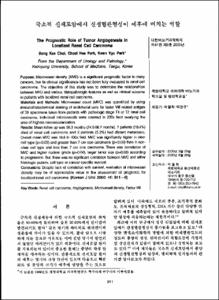국소적 신세포암에서 신생혈관형성이 예후에 미치는 역할
- Keimyung Author(s)
- Park, Choal Hee; Park, Kwan Kyu
- Journal Title
- 대한비뇨기과학회지
- Issued Date
- 2000
- Volume
- 41
- Issue
- 8
- Abstract
- Purpose: Microvessel density (MVD) is a significant prognostic factor in many cancers, but its clinical significance has not been fully evaluated in renal cell carcinoma. The objective of this study was to determine the relationships between MVD and various histopathologic features as well as clinical outcome in patients with localized renal cell carcinoma. Materials and Methods: Microvessel count (MVC) was quantified by using immunohistochemical staining of endothelial cells for factor VIII related antigen of 38 specimens taken from patients with pathologic stage T1 or T2 renal cell carcinoma. Individual microvessels were counted in 200× field overlying the area of highest neovascularization. Results: Mean follow up was 56.3 months (24.5-86.7months). 7 patients (18.4%) died of renal cell carcinoma and 2 patients (5.2%) had distant metastasis. Overall mean MVC was 16.6 in 400× field. MVC was significantly higher in clear cell type (p=0.03) and greater than 7cm size carcinoma (p=0.02) than in non-clear cell type and less than 7cm size carcinoma. There was correlation of MVC and higher nuclear grade (p=0.04), larger tumor size (p=0.03) according to progression. But, there was no significant correlation between MVC and either histologic pattern, cell type or cancer specific survival. Conclusions: Despite lack of correlation with survival, evaluation of microvessel density may be of appreciable value in the assessment of prognosis for localized renal cell carcinoma.
Key word : Renal cell carcinoma, Angiogenesis, Microvessel density, Factor VIII
- Alternative Title
- The Prognostic Role of Tumor Angiogenesis In Localized Renal Cell Carcinoma
- Publisher
- School of Medicine
- Citation
- 최봉기 et al. (2000). 국소적 신세포암에서 신생혈관형성이 예후에 미치는 역할. 대한비뇨기과학회지, 41(8), 911–916.
- Type
- Article
- ISSN
- 2005-6737
- Appears in Collections:
- 1. School of Medicine (의과대학) > Dept. of Pathology (병리학)
1. School of Medicine (의과대학) > Dept. of Urology (비뇨의학)
- 파일 목록
-
-
Download
 oak-bbb-1294.pdf
기타 데이터 / 1.03 MB / Adobe PDF
oak-bbb-1294.pdf
기타 데이터 / 1.03 MB / Adobe PDF
-
Items in Repository are protected by copyright, with all rights reserved, unless otherwise indicated.